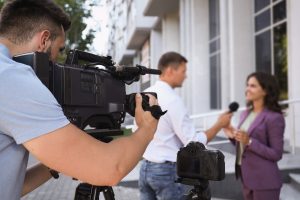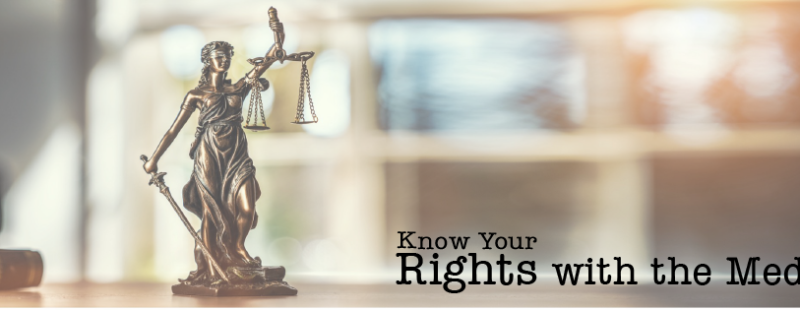Do you know your rights with the media?
When you are looking for press coverage or when you are the spokesperson contacted for an interview, it can feel like a reporter is the one calling all the shots. You have little say in how things play out. Your power and creditability could be at stake unless you know your rights with the media. Knowing your rights and exercising them puts you in a position of knowledge and keeps you in control of the process. Additionally, exercising your rights helps keep your working relationship with the media one of mutual respect and professionalism.
Following is a short list of important things to know when dealing with reporters or media professionals.
 The topic of the interview. The reporter likely won’t recite the exact questions they plan to ask, but they should be willing and able to communicate main talking points. If the topic feels outside of your area of expertise or could touch on points you are not at liberty to openly discuss take this opportunity to limit the scope of the interview.
The topic of the interview. The reporter likely won’t recite the exact questions they plan to ask, but they should be willing and able to communicate main talking points. If the topic feels outside of your area of expertise or could touch on points you are not at liberty to openly discuss take this opportunity to limit the scope of the interview.- Timeline for the interview. Feel free to negotiate a time that works for all parties. Remember that the reporter is most likely on a deadline. Try to find a time that gives ample time to prepare and gives them enough time to fine tune the story. Reporters are human and when rushed, they can make mistakes. Be mindful of how much time everyone needs to produce a high quality end result.
- Expected length of the interview. You have the right to set an amount of time that works for your schedule. This might be especially critical if you know other reporters are also seeking interview time.
- Location for the interview. Most newspaper or radio interviews are done over the phone, but TV or video require a setting of some kind. Be creative and think about locations that complement the interview topic. Be as flexible as possible. Most reporters will appreciate your suggestions of possible interview locations and will enjoy working with you to identify one that looks great on camera. You might want to review our blog on The Importance of Interview Settings.
- Know the interviewer. Reporters have unique interview styles. Some are tough. Others are nice. Some are well-prepared. Some not-so-much. There is wisdom in knowing the style of your interviewer, so do some research and know what to expect. Please consider reading 8 Tips for Developing Relationships with Journalists.
- What the reporter is looking for. Knowing the reporter’s angle for a story will help best determine how to prepare. This information in conjunction with a mutually understood list of talking points will help to respond well to the interviewer’s questions and avoid awkward moments for everyone.
- What prompted the interview request. Find out how the reporter learned about this story. It might have been from a wire report or a story they saw in another outlet. Sometimes reporters receive press releases on the results of new studies or surveys and need a local expert to help interpret the results. Find out how they learned about your expertise and why they chose you for their interview.
- Who else they are planning to interview. If you know other people connected to the story, you can better understand the reporter’s perspective. If the topic has some controversy or disputes related to it, you can address those arguments pre-emptively as you prepare or you can decide if the interview is in your best interest or that of your business.
- When the story will appear. You have a right to see how the reporter’s final product turned out. Don’t hesitate to purchase a copy of the publication, obtain broadcast clips or look for the story online. Remember these media opportunities could also be great sources of evergreen marketing materials.
- If the interview is live. Due to editing requirements, most TV interviews are recorded, but if you aren’t sure, ask the reporter. If it is possible to do a live interview, take advantage of it! You may get more time to state your case. Live interviews often give viewers a sense of importance and urgency over pre-recorded ones. In radio, though, you might want to be careful. We have heard and read stories about people who were interviewed live without realizing it. Doing your homework on the person interviewing you can be critical.
When dealing with the media, remember too that you have the right to:
- Offer background information. Reporter’s knowledge of their interview subjects can vary greatly, so sending a fact sheet or even verbally providing a brief overview at the start of the interview can help minimize any reporting errors.
- Ask to call a reporter back. If a reporter calls unexpectedly, you might need some time to prepare. Take a few minutes to gather any notes you think you might need and put yourself in the correct frame of mind to be interviewed. You don’t want to delay and risk missing the reporter’s deadline, but five or ten minutes can make all the difference in how well you come across during the interview.
- Stop an interview if necessary. While it’s not recommended, you do have the right to ask for a pause to use the restroom or wipe perspiration if you’re under hot lights.
- Tape the interview. An ethical reporter should advise you that you’re being recorded. Youneed to let the reporter know if you wish to record the interview yourself. Recording an interview is not But if the topic of your interview is or could be related to a court case with potential for a quote to be used (or misused) as evidence, you might wish to have your own record of what was said during the interview.
Remember, unless your media encounter is an ambush or stakeout interview, most are very friendly. You and the reporter are both professionals doing your best to get the story out to the audience that needs to hear it. Keep this list of your rights handy. Refer to it when you feel pressured and need a reminder that you can control in the situation. Use it as a checklist to help you prepare well before any interview or media appearance.
You can also review additional helpful blogs such as Media Tips for Business Leaders, Types of Media Interviews or The Importance of Media Interviews.
 Chris Kuban started Chemistry PR and Multimedia with a vision to effectively formulate corporate and non-profit brands across the country. He is an expert in Media Relations, Event Management and video production. Working with a team of local and national suppliers, vendors, employees, and consultants has allowed him to coordinate more than 246 national events that help deliver the ROI his clients seek. Follow him on Twitter or connect with him on LinkedIn. Chris is proud that his firm is ranked one of the Best St. Louis Public Relations Firms in the region.
Chris Kuban started Chemistry PR and Multimedia with a vision to effectively formulate corporate and non-profit brands across the country. He is an expert in Media Relations, Event Management and video production. Working with a team of local and national suppliers, vendors, employees, and consultants has allowed him to coordinate more than 246 national events that help deliver the ROI his clients seek. Follow him on Twitter or connect with him on LinkedIn. Chris is proud that his firm is ranked one of the Best St. Louis Public Relations Firms in the region.



